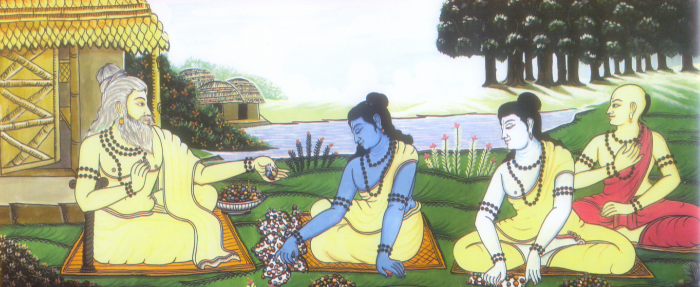Difference between revisions of "Gurukula (गुरुकुलम्)"
(img+) |
|||
| Line 2: | Line 2: | ||
Gurukula (Samskrit : गुरुकुलम्) is the place of learning for students after undergoing Upanayana, under the supervision of a reputed Guru. Gurukula system was an important unique feature of ancient education system but has now lost its glory owing to the present day educational system. | Gurukula (Samskrit : गुरुकुलम्) is the place of learning for students after undergoing Upanayana, under the supervision of a reputed Guru. Gurukula system was an important unique feature of ancient education system but has now lost its glory owing to the present day educational system. | ||
| − | + | [[File:Gurukulam.png|thumb|700x700px|Courtesy: Book 'Sarwang' Published by Adivasi Lok Kala Evam Boli Vikas Academy, Madhya Pradesh Sanskriti Parishad]] | |
Once can see numerous instances of principles and postulates of the educational practices from the ancient works. Education was regarded as the source of that Jnana which leads its recipients to successfully overcome difficulties and problems of life and take the path of Moksha. It was therefore insisted to be thorough, efficient with the goal of training experts in different branches. Since printing and paper were unknown, libraries and books did not exist and the training essentially focused on developing memory that would stand good stead throughout the student's life.<ref name=":0">Altekar, A. S. (1944) ''Education in Ancient India.'' Benares : Nand Kishore and Bros.,</ref> | Once can see numerous instances of principles and postulates of the educational practices from the ancient works. Education was regarded as the source of that Jnana which leads its recipients to successfully overcome difficulties and problems of life and take the path of Moksha. It was therefore insisted to be thorough, efficient with the goal of training experts in different branches. Since printing and paper were unknown, libraries and books did not exist and the training essentially focused on developing memory that would stand good stead throughout the student's life.<ref name=":0">Altekar, A. S. (1944) ''Education in Ancient India.'' Benares : Nand Kishore and Bros.,</ref> | ||
Revision as of 17:48, 6 February 2019
| This article needs editing.
Add and improvise the content from reliable sources. |
Gurukula (Samskrit : गुरुकुलम्) is the place of learning for students after undergoing Upanayana, under the supervision of a reputed Guru. Gurukula system was an important unique feature of ancient education system but has now lost its glory owing to the present day educational system.
Once can see numerous instances of principles and postulates of the educational practices from the ancient works. Education was regarded as the source of that Jnana which leads its recipients to successfully overcome difficulties and problems of life and take the path of Moksha. It was therefore insisted to be thorough, efficient with the goal of training experts in different branches. Since printing and paper were unknown, libraries and books did not exist and the training essentially focused on developing memory that would stand good stead throughout the student's life.[1]
परिचयः ॥ Introduction
Education was regarded as the best agency for improving society at all times and hence focus was that it should be available to all those who are qualified to receive it. Upanayana was the samskara, that was usually performed, to mark the initiation of a child (of all varnas and both genders) into education. It was further declared in the Brhadaranyaka Upanishad that
... विद्यया देवलोको देवलोको वै लोकाना श्रेष्ठस् तस्माद्विद्यां प्रशसन्ति ॥ यद्वै किञ्चानूक्तम् तस्य सर्वस्य ब्रह्मेत्येकता .... तस्मात् पुत्रमनुशिष्टं लोक्यमाहुस् तस्मादेनमनुशासति । (Brha. Upan. 1.5.16 and 17)[2]
One can attain the devaloka through vidya alone; devaloka being the best of the (three) worlds. Hence vidya is to be praised. (Here vidya is taken to mean meditation or that knowledge of Self required for attaining the higher worlds). Whatever is studied is all unified in the word Brahman.... Therefore they speak of an educated son as being conducive to the world. Hence (a father) teaches his son (Page No 230 of Reference [3]).
Thus we see that the goal of education is attainment of Self knowledge. Thus people of different varnas irrespective of their gender, social and financial status, received at least the rudiment of literary and religious education, until the first millennium of the Christian era when conducting upanayanas decreased among the varnas and girls were married at the age of 10 owing to several causes.[1]
Gurukula System
The Gurukula system was the mainstream education system till as recent as the first millenium which necessitated the stay of a student away from his home at the house or ashrama of Guru (teacher) who imparted valuable life lessons to the student.
References
- ↑ 1.0 1.1 Altekar, A. S. (1944) Education in Ancient India. Benares : Nand Kishore and Bros.,
- ↑ Brhdaranayaka Upanishad (Adhyaya 1 Brahmana 5)
- ↑ Swami Madhavananda. (1950 Third Edition) Brhadaranyaka Upanishad with the commentry of Shankaracharya. Mayavati : Advaita Ashrama

